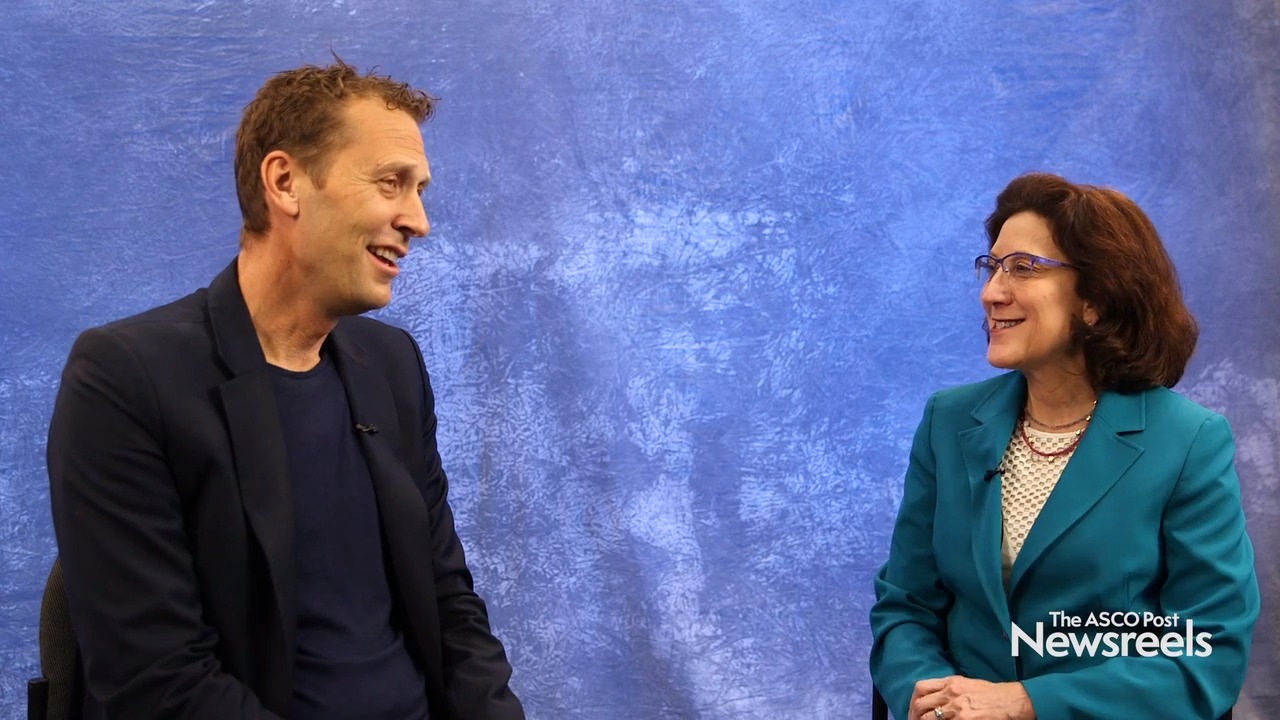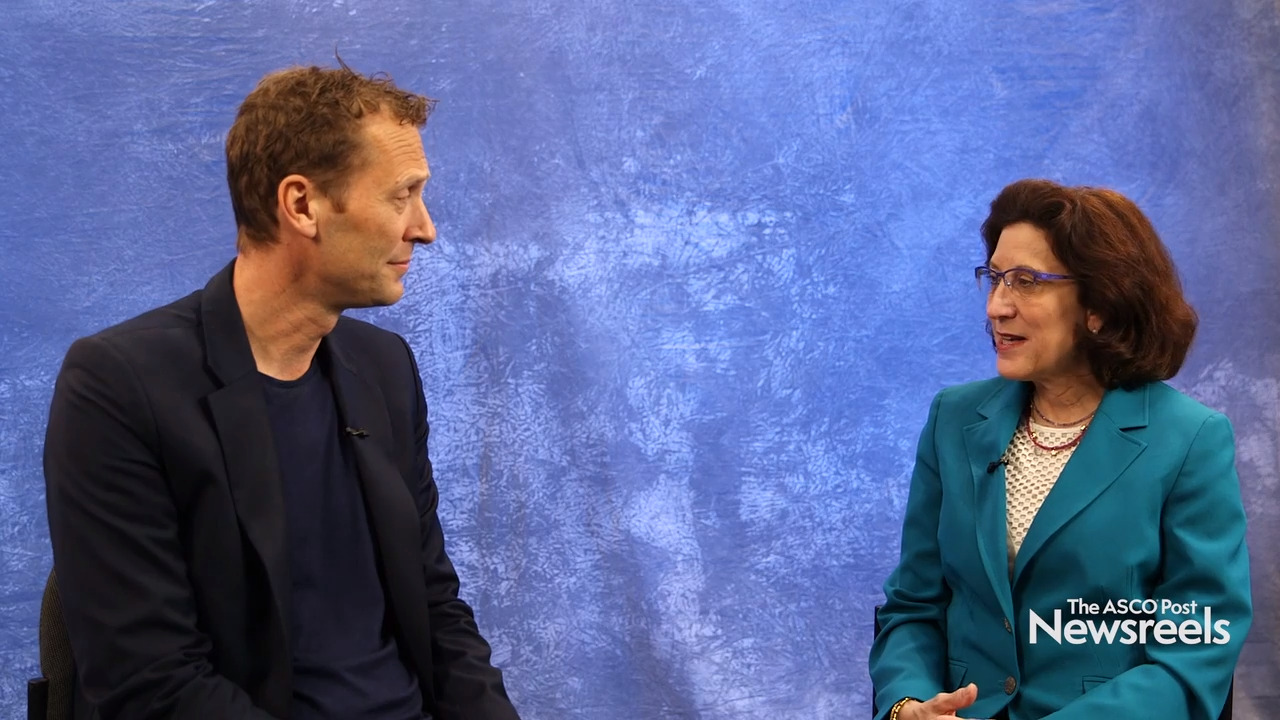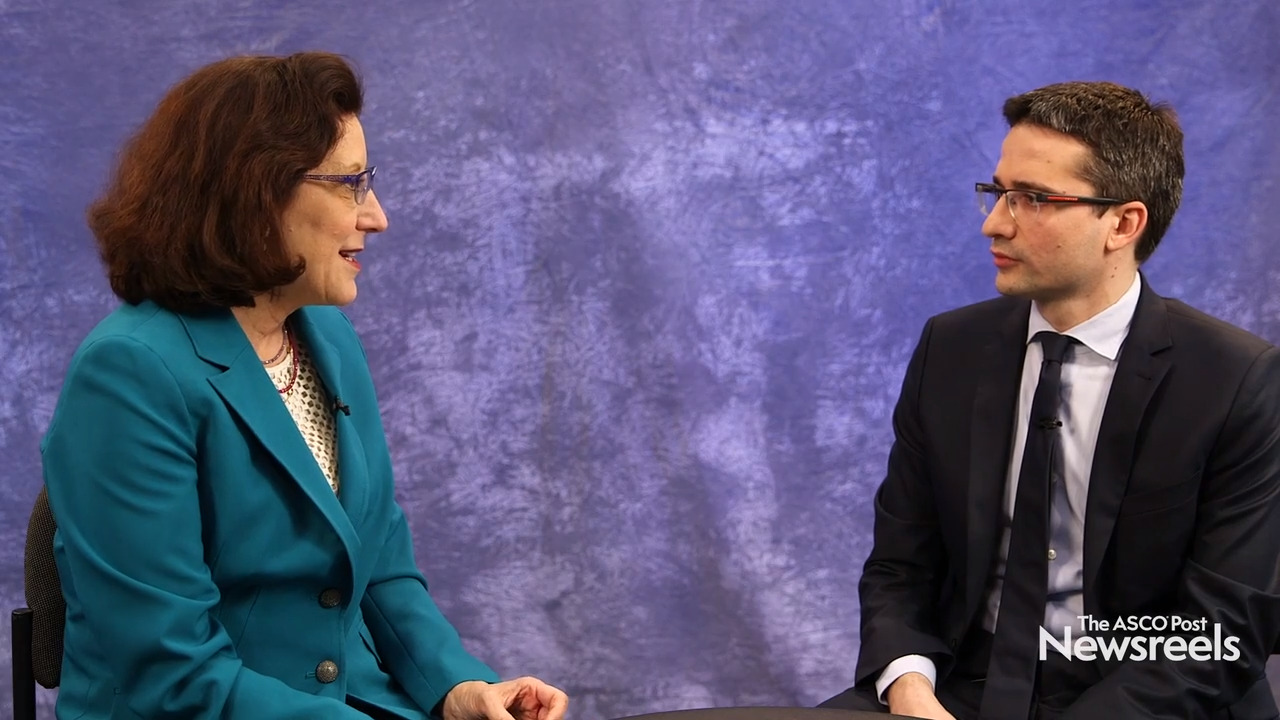Two Pivotal Studies in Breast Cancer Report Further Analyses
At the 2019 ASCO Annual Meeting, two pivotal breast cancer trials reported final or additional analyses: one confirmed the negative results seen in earlier reports,1 and the other supported a new survival benchmark.2 KRISTINE: Neoadjuvant T-DM1/Pertuzumab Sara A. Hurvitz, MD, of the David Geffen...
Expert Point of View: Vernon K. Sondak, MD
Commenting for The ASCO Post, melanoma expert Vernon K. Sondak, MD, Chair of the Department of Cutaneous Oncology at Moffitt Cancer Center, Tampa, maintained that the association between immunotherapy-related toxicity and better outcomes is not yet clear. He first noted the impact of novel...
Study Finds Immune-Related Adverse Events Herald Benefit With Adjuvant Pembrolizumab in Melanoma
In the EORTC 1325/KEYNOTE-054 trial of adjuvant pembrolizumab in patients with stage III melanoma, recurrences were reduced by 44% in the immunotherapy arm, vs placebo, but this benefit increased to a 63% reduction in risk among patients developing an immune-related adverse event on treatment.1...
FDA Grants Breakthrough Therapy Designation to Pembrolizumab Plus Lenvatinib in Advanced HCC
The U.S. Food and Drug Administration (FDA) has granted Breakthrough Therapy designation to the programmed cell death protein 1 inhibitor pembrolizumab in combination with the multiple kinase inhibitor lenvatinib for the potential first-line treatment of patients with advanced unresectable...
Immunotherapy After Locally Ablative Therapy for Oligometastatic NSCLC
In a single-center phase II trial reported in JAMA Oncology, Bauml et al found that pembrolizumab given after locally ablative therapy appeared to be associated with improved outcomes in patients with oligometastatic non–small cell lung cancer (NSCLC). In the study, 45 evaluable...
Maintenance Panitumumab vs Panitumumab/Fluorouracil/Leucovorin in RAS Wild-Type Metastatic Colorectal Cancer
In an Italian phase II trial reported in JAMA Oncology, Pietrantonio et al found that maintenance panitumumab alone was inferior in terms of progression-free survival (PFS) compared to maintenance panitumumab plus fluorouracil/leucovorin in RAS wild-type metastatic colorectal cancer. Study Details ...
Ramucirumab Plus Pembrolizumab in Previously Treated Advanced Gastroesophageal Cancer, NSCLC, and Urothelial Carcinoma
Results from a phase IB trial expansion stage reported in The Lancet Oncology by Herbst et al showed the combination of ramucirumab plus pembrolizumab had manageable toxicity and antitumor activity in previously treated advanced gastroesophageal cancer, non–small cell lung cancer (NSCLC), and ...
Incidence of Olaratumab Infusion-Related Reactions
In a study reported in the Journal of Oncology Practice, Van Tine et al found that infusion-related reactions occurred in 14.4% of patients receiving olaratumab in clinical trials, with grade ≥ 3 events occurring in 2.3%. (Olaratumab was withdrawn from the global market on April 25, 2019, based...
Immune Checkpoint Inhibitor Rechallenge After Immune-Related Adverse Events
In a study reported in JAMA Oncology, Simonaggio et al found that rechallenge with an immune checkpoint inhibitor after occurrence of immune-related adverse events was associated with occurrence of an immune-related adverse event in approximately half of patients, with no increase in severity....
Combination Therapy With Immunochemotherapy and an Antibody-Drug Conjugate in DLBCL
As reported in The Lancet Oncology, Hervé Tilly, MD, and colleagues found that the combination of polatuzumab vedotin, an antibody-drug conjugate targeting the CD79b component of the B-cell receptor, with immunochemotherapy showed high response rates in the phase II portion of a phase I/II study in ...
How Immunologic Dysregulation in the Multiple Myeloma Microenvironment May Affect Response to CAR T-Cell Therapy
Despite an avalanche of novel therapies approved by the U.S. Food and Drug Administration (FDA) over the past decade in the treatment of multiple myeloma, including proteasome inhibitors and immunomodulatory drugs, this blood cancer remains largely incurable, and nearly 13,000 people are expected...
Benefit Seen With Targeted Therapies in Elderly and Medically Complex Patients With Metastatic RCC
Many elderly and medically complex patients with metastatic renal cell carcinoma (RCC)—who are often underrepresented in clinical trials—saw overall survival benefits from treatment with targeted therapies, according to a study that analyzed 13 years of data on Medicare patients...
GOG-0218: Final Overall Survival Results for Addition of Bevacizumab to Chemotherapy in Ovarian Cancer
The final overall survival analysis of the phase III GOG-0218 trial, reported in the Journal of Clinical Oncology by Tewari et al, showed no benefit of adding bevacizumab to chemotherapy in women with newly diagnosed, incompletely resected, advanced ovarian cancer. The trial included 1,873 women...
Combination Immunotherapy and Inhibitors of DNA Damage Repair in the Treatment of Small Cell Lung Cancer
Unlike non–small cell lung cancer (NSCLC), which has seen a paradigm shift in treatment modalities with the discovery of genetic signatures (including EGFR mutations) that are responsive to targeted drugs, systemic treatment of small cell lung cancer (SCLC) has remained largely unchanged for over...
SOPHIA Trial Tests Margetuximab in Heavily Pretreated Patients With HER2-Positive Metastatic Breast Cancer
In the phase III SOPHIA trial of 536 heavily pretreated patients with HER2-positive metastatic breast cancer, the novel anti-HER2 antibody margetuximab plus chemotherapy led to significant improvements in progression-free survival, response, and clinical benefit compared with...
Enfortumab Vedotin After Checkpoint Inhibition in Metastatic Urothelial Cancer
A phase II study found that treatment with the antibody-drug conjugate enfortumab vedotin achieved responses in 44% of patients with locally advanced or metastatic urothelial cancer previously treated with platinum chemotherapy and a checkpoint inhibitor. This is a noteworthy study because it...
Targeting FOLFOXIRI Plus Bevacizumab to a Metastatic Colorectal Cancer Subset
In a population of patients with metastatic colorectal cancer deemed to be at high risk by the presence of circulating tumor cells (CTCs), first-line treatment with FOLFOXIRI plus bevacizumab improved progression-free survival by about 3 months, compared with modified FOLFOX plus bevacizumab,...
Activity of Niraparib Plus Pembrolizumab in Recurrent Ovarian Carcinoma
In a pooled analysis of the phase I/II TOPACIO/KEYNOTE-162 study reported in JAMA Oncology, Konstantinopoulos et al found evidence of activity of combined niraparib and pembrolizumab in a cohort of patients with recurrent ovarian carcinoma. Study Details The analysis included 60 evaluable women...
Neoadjuvant Immunotherapy May Benefit Patients With Early-Stage NSCLC
Neoadjuvant immunotherapy had encouraging activity and demonstrated favorable safety in patients with resectable early-stage non–small cell lung cancer (NSCLC), according to two studies presented at the 2019 ASCO Annual Meeting.1,2 This approach has the potential to boost the survival rate in...
Treatment of Immune Checkpoint Inhibitor Immune-Related Cutaneous Adverse Events
In a study reported in the Journal of Clinical Oncology, Phillips et al found that immune-related cutaneous adverse events in patients receiving immune checkpoint inhibitors generally responded to symptom- and phenotype-directed dermatologic therapies, and that biologic therapies were effective in...
ECHO-301/KEYNOTE-252: Addition of Epacadostat to Pembrolizumab in Unresectable or Metastatic Melanoma
As reported in The Lancet Oncology by Long et al, the phase III ECHO-301/KEYNOTE-252 trial showed no improvement in progression-free or overall survival with the addition of the IDO1 inhibitor epacadostat to pembrolizumab in unresectable stage III or stage IV melanoma. Study Details In the...
Multidisciplinary Approach for Addressing Immunotherapy-Related Toxicities
New research published in JNCCN—Journal of the National Comprehensive Cancer Network and presented by Jarushka Naidoo, MBBCh, at the NCCN 2019 Annual Conference suggests that institutions and networks that utilize immunotherapy should consider establishing multidisciplinary teams for...
FDA Approves Daratumumab in Combination With Lenalidomide and Dexamethasone for Newly Diagnosed, Transplant-Ineligible Patients With Multiple Myeloma
Today, the U.S. Food and Drug Administration (FDA) approved daratumumab (Darzalex) in combination with lenalidomide and dexamethasone for the treatment of patients with newly diagnosed multiple myeloma who are ineligible for autologous stem cell transplant (ASCT). The application received approval ...
15-ICML: Final Data From ALCANZA: Brentuximab Vedotin for CD30-Positive CTCL
Final analyses from the ALCANZA study, a phase III trial investigating brentuximab vedotin vs physician’s choice for the treatment of CD30-positive cutaneous T-cell lymphoma (CTCL), were presented by Horwitz et al at the 15th International Conference on Malignant Lymphoma (ICML; Abstract...
Outcomes of Immune Checkpoint Inhibitor Treatment in Patients With Advanced NSCLC Receiving Baseline Corticosteroids
In a single-center study reported in the Journal of Clinical Oncology, Ricciuti et al found better outcomes with immune checkpoint inhibitor treatment among patients with advanced non–small cell lung cancer (NSCLC) receiving baseline prednisone equivalent of ≥ 10 mg daily for...
Niraparib Plus Pembrolizumab in Advanced Triple-Negative Breast Cancer
In the phase II TOPACIO/KEYNOTE-162 trial reported in JAMA Oncology, Vinayak et al found evidence of activity of combined niraparib and pembrolizumab in a cohort of patients with advanced or metastatic triple-negative breast cancer, with higher response rates seen in patients with BRCA mutations or ...
15-ICML: Post Hoc Analysis of MAVORIC Study: Mogamulizumab in Patients With Previously Treated Cutaneous T-Cell Lymphoma
The MAVORIC study—presented by Scarisbrick et al at the 15th International Conference on Malignant Lymphoma (ICML; Abstract 034)—examined the efficacy of mogamulizumab, a monoclonal antibody that targets the CC chemokine receptor 4 (CCR4), in patients with previously treated mycosis...
Activity of Nivolumab for Renal Cell Carcinoma Brain Metastases
In an analysis of the phase II GETUG-AFU 26 NIVOREN study reported in the Journal of Clinical Oncology, Flippot et al found that nivolumab had limited activity in patients with previously untreated brain metastases from clear cell renal cell carcinoma. The study assessed nivolumab in patients with ...
Synergistic Relationship Between Radiotherapy and Immunotherapy for Squamous Cell Carcinoma of the Head and Neck
Recent technologic improvements in radiotherapy now offer an unprecedented opportunity to enhance immune response, and going forward, may play a role in the definitive treatment of head and neck cancer, according to William Stokes, MD, Assistant Professor in the Department of Radiation Oncology at...
Immune Therapies Emerging in Disease-Specific Treatment of HPV-Positive Head and Neck Cancer
Patients with human papillomavirus (HPV)-related head and neck cancer stand to benefit greatly from immunotherapy, according to Nabil F. Saba, MD, FACP, Director, Head and Neck Medical Oncology Program, Winship Cancer Institute of Emory University, Atlanta. He added, immunotherapy will likely play...
Update on Early-Stage Studies of Novel Treatments in Glioblastoma
Outcomes are typically grim for patients with recurrent glioblastoma multiforme. At the 2019 Annual Scientific Meeting of the American Association of Neurological Surgeons (AANS), three early-stage studies hinted at ways that standard treatments might be made more effective. Metronomic Dosing of...
Expert Point of View: Vanita Noronha, MD
The KEYNOTE-048 trial is practice-changing, according to its invited discussant, Vanita Noronha, MD, Professor of Oncology at Tata Memorial Centre in Mumbai, India. Although a number of questions remain to be answered, she said the take-home message is that the study “met most of its primary...
Fixed-Duration Venetoclax Plus Obinutuzumab as First-Line Treatment in Older Patients With CLL Who Have Comorbidities
A fixed-duration regimen of venetoclax plus obinutuzumab demonstrated superior progression-free survival, complete response rates, and minimal residual disease (MRD) negativity compared with chlorambucil plus obinutuzumab as first-line therapy for older patients with chronic lymphocytic leukemia...
FDA Approves Pembrolizumab for the First-Line Treatment of Head and Neck Squamous Cell Carcinoma
On June 10, the U.S. Food and Drug Administration (FDA) approved the anti–programmed cell death protein 1 immunotherapy pembrolizumab (Keytruda) for the first-line treatment of patients with metastatic or unresectable recurrent head and neck squamous cell carcinoma. Pembrolizumab was approved for...
Expert Point of View: Ian Chau, MD
IAN CHAU, MD, a consultant medical oncologist at the Gastrointestinal and Lymphoma Units of The Royal Marsden NHS Foundation Trust in London and Surrey, United Kingdom, was the invited discussant of KEYNOTE-062. In an interview with The ASCO Post, he first commented that although single-agent...
KEYNOTE-062: Pembrolizumab Is a New First-Line Option in Gastric/Gastroesophageal Junction Cancer
KEYNOTE-062, a study of first-line treatment in patients with advanced gastric or gastroesophageal junction adenocarcinoma, found pembrolizumab to be noninferior to chemotherapy and perhaps better than chemotherapy in a subgroup of patients. The results were reported at the 2019 ASCO Annual Meeting ...
Comparison of Combination Dosing Schedules of Neoadjuvant Ipilimumab/Nivolumab in Macroscopic Stage III Melanoma
In the phase II OpACIN-neo study reported in The Lancet Oncology, Rozeman et al identified a promising dosing schedule for neoadjuvant ipilimumab/nivolumab in macroscopic stage III melanoma. Study Design The trial included 86 evaluable patients with resectable stage III melanoma involving the...
Rate and Outcome of Late Relapses in Patients With DLBCL Treated With Immunochemotherapy
In a study reported in the Journal of Clinical Oncology, Wang et al identified the rates and outcomes of relapses of diffuse large B-cell lymphoma (DLBCL) in patients who had achieved 24-month event-free survival (EFS) after immunochemotherapy. Study Details The study involved 1,324...
EHA 2019: ASCEND Trial Compares Acalabrutinib vs Investigator’s Choice in Relapsed or Refractory CLL
The randomized, global, multicenter, open-label phase III ASCEND trial evaluated the efficacy and safety of acalabrutinib vs investigator’s choice of rituximab/idelalisib or rituximab/bendamustine in patients with relapsed or refractory chronic lymphocytic leukemia (CLL). Ghia et al presented ...
EHA 2019: CASSIOPEIA Trial Examines Addition of Daratumumab to Standard Treatment Before and After ASCT in Multiple Myeloma
In the phase III CASSIOPEIA trial, reported in The Lancet and presented at the 24th Annual Congress of the European Hematology Association (EHA; Abstract S145) by Moreau et al, daratumumab plus bortezomib/thalidomide/dexamethasone (D-VTd) given before and after autologous stem cell transplantation...
2019 ASCO: 3-Year Outcomes in the KRISTINE Trial on Neoadjuvant Trastuzumab Emtansine Plus Pertuzumab in HER2-Positive Breast Cancer
As reported at the 2019 ASCO Annual Meeting (Abstract 500) and in the Journal of Clinical Oncology by Hurvitz et al, 3-year outcomes in the phase III KRISTINE trial showed that neoadjuvant trastuzumab emtansine (T-DM1) plus pertuzumab was associated with increased risk of event-free survival events ...
TONIC: PD-1 Blockade in Metastatic Triple-Negative Breast Cancer
Clinical and translational data from the TONIC trial, published in a research letter by Voorwerk et al in Nature Medicine, indicated that short-term doxorubicin and cisplatin may induce a more favorable tumor microenvironment and increase the likelihood of response to programmed cell death protein...
KEYNOTE-001: 5-Year Overall Survival With Pembrolizumab in Advanced NSCLC
Long-term follow-up of the phase I KEYNOTE-001 study reported in the Journal of Clinical Oncology by Garon et al showed that pembrolizumab monotherapy was associated with an estimated 5-year overall survival of 23.2% for treatment-naive patients and 15.5% for previously treated patients with...
MAIA Trial: Addition of Daratumumab to Lenalidomide/Dexamethasone in Untreated Myeloma Ineligible for ASCT
In the phase III MAIA trial reported in The New England Journal of Medicine, Facon et al found that the addition of daratumumab to lenalidomide/dexamethasone significantly improved progression-free survival in previously untreated multiple myeloma ineligible for autologous stem cell transplantation ...
Peter Schmid, MD, PhD, and Hope S. Rugo, MD, on Breast Cancer: Next Steps in Immunotherapy
Hope S. Rugo, MD, of the University of California, San Francisco, and Peter Schmid, MD, PhD, of Barts Cancer Institute, Queen Mary University of London, discuss ongoing trials of immunotherapy for early triple-negative breast cancer; immunotherapy in other disease subtypes such as estrogen receptor–positive and HER2-positive; and checkpoint inhibition in PD-L1–negative disease.
FDA Pipeline: Designations and Reviews in Myelofibrosis, Myelodysplastic Syndromes, Biliary Tract Cancer, and T-Cell Receptor Therapy
Recently, the U.S. Food and Drug Administration (FDA) granted Fast Track designation for momelotinib in myelofibrosis, granted Priority Review to a biologics license application for luspatercept in myelodyslastic syndromes and beta-thalassemia, granted Orphan Drug designation for a new chemical...
Resuming Immune Checkpoint Inhibitor Therapy After Immune-Mediated Diarrhea and Colitis
In a retrospective multicenter study reported in the Journal of Clinical Oncology, Abu-Sbeih et al found that approximately one-third of patients resuming immune checkpoint inhibitor therapy after improvement in immune-mediated diarrhea and colitis experienced a recurrence of the adverse effect....
2019 ASCO: OPTiM Study on T-VEC for Unresectable Melanoma
New research on the immunotherapy talimogene laherparepvec (T-VEC)—an injectable oncolytic virus—for patients with unresectable melanoma was presented by Milhem et al at the 2019 ASCO Annual Meeting (Abstract 9524). Researchers reported the ad hoc analysis of progression-free survival...
Peter Schmid, MD, PhD, and Hope S. Rugo, MD, on Metastatic Triple-Negative Breast Cancer: Atezolizumab Plus Nab-paclitaxel
Hope S. Rugo, MD, of the University of California, San Francisco, and Peter Schmid, MD, PhD, of Barts Cancer Institute, Queen Mary University of London, discuss an update of the IMpassion130 interim overall survival analysis of atezolizumab plus nab-paclitaxel in previously untreated locally advanced or metastatic triple-negative breast cancer (Abstract 1003).
Hope S. Rugo, MD, and Matteo Lambertini, MD, PhD, on the SOPHIA Trial in HER2-Positive Metastatic Breast Cancer: Chemotherapy Plus Margetuximab vs Trastuzumab
Matteo Lambertini, MD, PhD, of the University of Genova and Policlinico San Martino Hospital, and Hope S. Rugo, MD, of the University of California, San Francisco, discuss findings from the SOPHIA trial on margetuximab plus chemotherapy vs trastuzumab plus chemotherapy in patients with HER2-positive metastatic breast cancer after prior anti-HER2 therapies (Abstract 1000).



